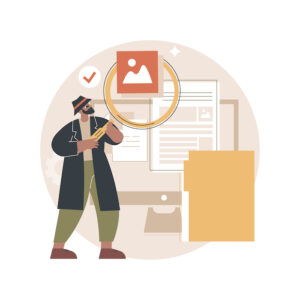Why it is crucial for an IT professional to implement a contract management solution ASAP
- Posted on

Intro
If you have taken on a new CIO post, you
are probably well familiar with the following story. The first time you take on
the CIO mantle, you are eager, enthusiastic, and ready to get things up and
running. But before you jump into all the interesting prospects that the role has
to offer, you need to take care of the things that the previous CIO has left
behind. The situation you’re dealt with needs to be assessed.
But, first things first. Assessing the
situation is the first step. We need to get a grasp of what and whom we are
actually working with. Hence, we need to do the math. The math on who our
vendors are, what are they doing for us, what will they cost us.
And then another big wave comes. You’ve
been hit with the harsh truth, splash! No
overview in sight. If you are lucky, you’ll find a folder or two. Maybe even
some papers on the bottom of the drawer. This is the point where we tend to roll
up our sleeves. Open up a new Excel doc, and start piecing the puzzle. We’ve
been here many times before, starting from scratch, building that infamous
Excel contract list, and it’s always the same process. Once you have an
understanding of all the contracts that you need to deal with, the second step
comes into play.
The financials. Yes, the budgeting and the forecasting.
Obviously, we need a comprehensive financial report, containing all this info
in order to figure out the cost baseline. Or simply put, to comprehend what is
already contractually agreed.
And it’s not so easy. Forgetting to
terminate some contract (that quite possibly you might even not know that even
exists) seems to be given. But once the invoice comes, you will know. But at
that point, it will be too late to do something about it. But, I as a
professional and furthermore as a person, was more than relieved to find out that
I was not the only one. After talking to a lot of colleagues, I was assured we
shared the same problem.
Are you thinking about all the fancy P2P
solutions? Or about those complicated ERP systems? Of course, I’m aware of them,
but I (and my colleagues) were in need of something simple that gets the job
done. I had no use of all the bells and whistles. What I needed was a
user-friendly contract management solution that will back me up. Oh, and save
me from all those extra hours of work, and remind me to terminate that
contract. Paying for things that I don’t need isn’t my thing.
What is contract management?
Well, let’s start things off by quickly defining what a contract is. There are a lot of definitions out there, all of which you can google, so I won’t bother you with that. Simply put, a contract is a binding agreement between two or more people or parties. An agreement that creates mutual obligations enforceable by law. When it comes to business contracts, they are used to dictate the roles between a company and its vendors, partners, customers, and employees.
Logically, contract management is the act when one party takes the responsibility of managing the contracts for the employees or the vendors or any other parties.
Contract management often involves the process of overseeing the creation, signature, storage, execution, and review of contracts. However, some people tend to make the distinction between contract administration and contract management.
These terms are often mixed or used as synonyms, but they actually represent different phases of the contracting Contract administration is the work that needs to be done before a contract is signed into effect. On the other hand, contract management describes what needs to be done after signing the contract. Ensuring that deliverables and deadlines are adhered to as outlined in the agreement.
Contract management in IT
When it comes to IT, especially if you are stepping into someone’s shoes, you are well aware what requires more time and management. There’s a good reason why it’s called contract management, right?
IT contracts come in many forms. There are software licenses, hardware leases, subscription to online services, maintenance and service agreements, consultancy agreements, and the list goes on. Each of these IT contracts include different terms and conditions and, of course, different deadlines. This makes accurate tracking and maintenance a real challenge for any IT manager.
Often, when we say contract management, we think of all the client contracts. But, very often, in IT, we’re looking from the vendor’s perspective. The ordinary IT contract portfolio includes IT vendors, suppliers, consultants, service agreements, and so on. And in order to manage them, you need to know where the contracts are. Seems obvious, but it is rarely a walk in the park. The second challenge is the usual annual billing. Not all contracts have it, but most of the typical service contracts and license contracts do. You will receive an invoice and a deadline to terminate the contract, and if you miss it, then you’re in it for another year. Congratulations. You’re in for another year of not using that particular thing that you’ve paid a couple of thousand euros for.
Why IT professionals can’t afford to wait with implementing contract management solution
Implementing an easy-to-use contract management solution is a no brainer for most IT professionals. The benefits are endless. Some would say that doing so is expensive. Some would even go further and say that a Google spreadsheet does a decent job. But when you take a moment to think about it, that is rarely the case.
A user-friendly contract management solution will save you a great deal of blood, sweat, and tears. That is why you should think about finding and implementing one ASAP.
But just in case you are still unsure about all the benefits, brace yourselves because here comes a nice, organized list.
All contracts in one place
‘Just click on the third folder from the right. No, wait. It was in the second from the left. Oh, that’s not it…wait…’ Sounds familiar? We’ve all been there. Having all the contacts in one place does sound a bit utopian. But, hear me when I say it, it’s not impossible. You can have one, big, organized digital contract repository. It’s very much possible to do it with any contract management solution. Don’t waste a second searching through all the folders, or even worse, the filing cabinet.
Don’t miss a deadline
Missing a deadline is maybe the most painful part of the unorganized contract management process.
‘Why painful?’ one would think. Well, because missing a deadline would not only make a big hole in your pocket but also a big hole in your soul. No matter how organized your contact spreadsheet is, it won’t remind you of the upcoming deadline. To avoid all that, you’ll definitely need a nice and straightforward contract management system that will constantly remind you of each upcoming deadline.
Improved forecasting
Indulge me in imagining the following scenario. You’re planning your budget for the next year. There’s no paper scattered on the desk, not a spreadsheet in sight. Just one open tab. All the info that you can possibly need to make the best decisions is at the reach of your hand. A dream come true, right? Well, nowadays, with the right contract management solution, it can be your pleasant reality.
Digitize in the remote world
Indulge me in imagining the following scenario. You’re planning your budget for the next year. There’s no paper scattered on the desk, not a spreadsheet in sight. Just one open tab. All the info that you can possibly need to make the best decisions is at the reach of your hand. A dream come true, right? Well, nowadays, with the right contract management solution, it can be your pleasant reality.
Save money
Nothing comes free. But some things are well worth investing in. And we tend to buy a lot of things so we can save money in the long run. When it comes to a contract management solution, it might seem a bit counterintuitive at first. There is one thing people tend to forget, though. One missed deadline over a renewal that you should have cancelled is often a lot more expensive than the lifetime cost of these solutions.
Evaluate your company’s IT roadmap
Evaluating is always a smart move. Especially when it comes to strategy. And having all the vendors and suppliers in one organized place could be of immense help when evaluating the company’s IT roadmap. But why should only the IT department be the one to enjoy all the fun and perks, right?! The right contract management solution can be beneficial to various company departments. The legal department, purchasing, procurement, even the business department can be in your debt. A contract management solution could easily fit into the overall company roadmap in the long run.
Cheaper than developing one in-house
We’re managing the IT department. We could simply build ourselves a contract management solution! No one can deny that. But is it worth it? You have the contracts. You have the resources to do it yourself. But do you really want to do it? Is that your core competency? Does that make you tick? It would be a waste to use your internal IT resources to build something that is not your bread and butter. Your team could be quickly demotivated and not to mention all the financial repercussions. You’ll also need to dedicate resources for its maintenance and upgrading. Buying something has never been cheaper.
Can’t rely on spreadsheets
We all love spreadsheets. They can be the best resource at times. But they cannot replace contract management. See, the problem with spreadsheets is, they won’t remind you when a deadline is approaching. They offer no dynamic support, either. You have to do all your budget planning and associated forecasting processes manually. You have to actively open the spreadsheet, do your filters, and really make an effort. So it’s more of a pull request, not so much of a push. When it comes to spreadsheet, you have to do the work yourself. And then obviously we know how spreadsheets work. They’re great to a certain extent, but then as soon as you have many different users working the same sheets, catastrophe is bound to happen. And you will never be certain of what exactly happened. Columns might disappear, data might disappear. And no one wants that.
Contract data security
Data security has always been an important issue. And your data is as safe as it is the place where it is being kept. So think about the safety of that drawer or even your own infrastructure. Once you’ve implemented contract management solutions you needn’t worry about such things as safety. The many security mechanisms to keep your data safe and private with be at your disposal at all times. The strategy relies on the best providers for infrastructure and is also GDPR compliant. The best guarantee for your safety is the fact that this strategy uses encryption to make sure that your data stays yours.
Cloud first strategy
The cloud has become the base that enables businesses to transform, differentiate, and gain competitive advantage. So, a cloud first strategy is something that was bound to happen. An astonishing number of companies are moving software as a service or cloud first. You are well versed in all the tech stuff, but you don’t want to use it for everything. And nothing can replace the feeling you get when the only thing you need is basically a browser. While all the rest is being taken care of.
What type of contract management solution do you need?
Considering all the benefits that contract management solutions provide, it’s no surprise that there are a lot to choose from. As with any solution, you’ll need to find the one that best suits your needs. Still, I believe there are a couple of boxes that every decent solution needs to tick to be a fantastic addition to the IT department. And here comes the checklist.
One you can get up and running quickly
We live in a pragmatic world. So the first box that a contract management solution must tick is for it to be user friendly. Make sure that you find a solution that you can get up and running quickly. At the end of the day, you want to save time, not spend hours onboarding. And why not find something that is eye-candy as well? I, personally, never really understood why ERP software needs to be so ugly and complicated. It’s ok to be vain when it comes to SaaS solutions. To sum up, find a solution that looks really good, is pretty straightforward, and requires almost no onboarding.
Easy to use
I think this one is pretty self-explanatory. No matter how much of an IT expert you are, you don’t want to spend hours ponding over a contract management solution. You surely have bigger fish to fry. So find one that is easy to use. It is as easy as one-two-three.
Secure
Data security is important. Contract data security is essential. It goes without saying that you need to find a contract solution that keeps your data safe and private. I found Microsoft Azure a great hosting place. It really is one of the most secure solutions available in the industry. And, of course, the data needs to be encrypted. It’s great if you find one that runs regular vulnerability assessments and penetration tests. It will certainly give you peace of mind.
Cloud based
Nowadays everything is transferred to the cloud. Many companies are implementing a cloud first strategy. And it makes perfect sense, especially in these modern remote working conditions. So it goes without saying that you need cloud based contract management solutions. You can forget about long and dreadful installation processes and can rest assured that your contracts are secure.
IT specialized
There are a lot of contract management solutions out there, so how can you choose the right one? Choosing the one that best suits your needs is essential. As an IT professional, you don’t need complicated and unattractive ERP or P2P systems. Best case scenario, you’ll find a solution that was developed with IT decision-makers in mind. One that covers all your contract management needs but doesn’t overcomplicate things. One so easy to use that you won’t need to waste an extra minute of your time.
Customizable
Everything looks and feels better when we add a dash of personalization to it. To be able to make the most out of your contract management solution, you’ll also need to find one that can be easily customized. You’ll certainly want to configure your account, enter customized data files, customized categories, and so on. Authorization, must not be omitted, too. It could save you a lot of time and trouble down the road.
Multi-currency Support
The chances are you are not working only locally. All those vendors, suppliers, purchasers, servicers often come from different geographical regions. And that brings about another problem – currencies. So it’s only logical that you should look for a multi-currency support contract management solution.
APIs and Single Sign-On
We all want solutions that can be seamlessly synchronized and integrated. Well we’re in luck since API makes sure that we’ve got everything we need integrated. Needless to say, you just need a contract management solution that supports API. So what else can you ask for? Single Sign-On will do nicely. That way, you can use your SSO provider instead of using a separate username and password. If that is what you prefer, of course.
What type of contract management solution do you need?
There’s one thing for certain. The time is ripe for implementing an easy to use contract management solution. Just think about all the hours, money, and nerves you are going to save in the long run.
And just one more thing I would like to recommend to you. Since I am well aware that finding the right solution can be a wearisome prospect.
Don’t spend hours searching, but give one a try. After the trial, you will know if that particular solution fits your needs. If not, you’ll understand just what extra features you need.
That’s why I’m always happy to share a piece of my cake with my fellow colleagues. A free trial. It will be my pleasure if you give it a try. I made sure that it fulfils all your IT contract management needs. Happy contracting!







